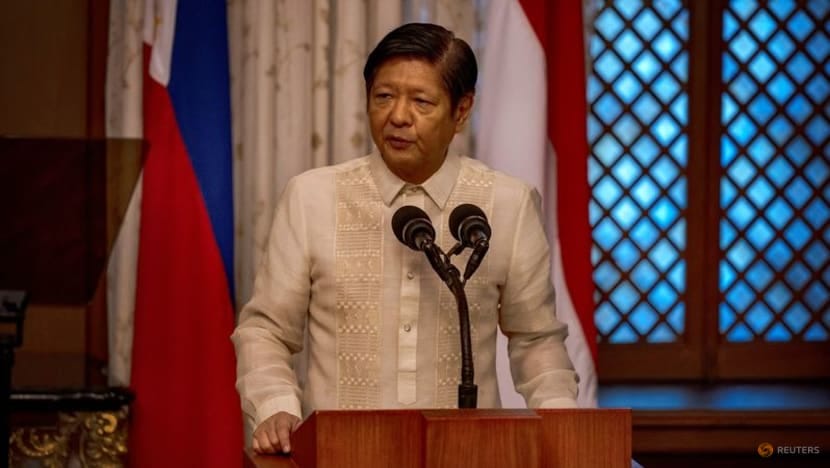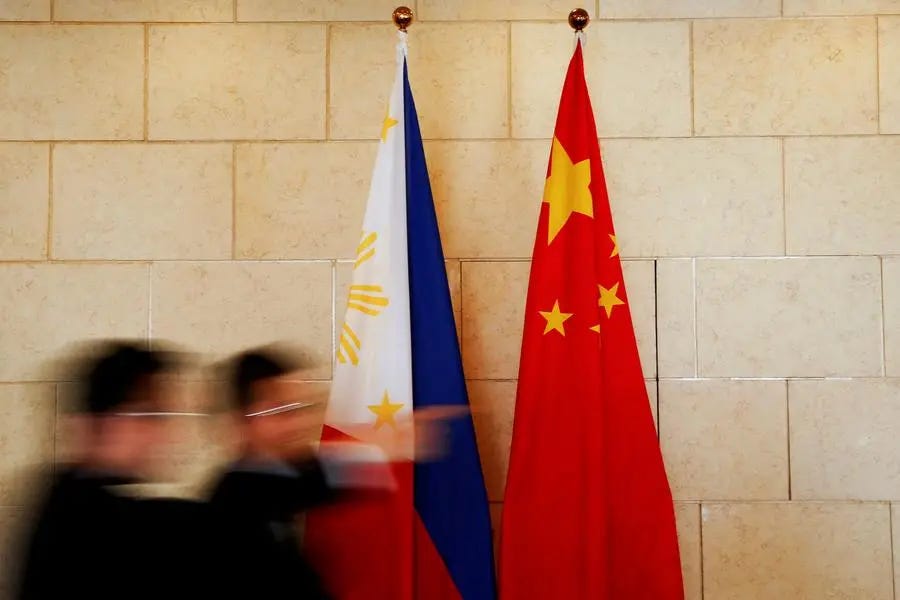China-Philippines Spat Escalates: Diplomatic Tensions Rise
Philippines will push back against China if maritime interests ignored, Marcos urges neighbors to stand together against China in the SCS, China's embassy condemns Philippine envoy's remarks on SCS
UPDATES: The Philippines will cooperate with China in talks on the disputed South China Sea, President Ferdinand Marcos Jr said on Monday (Mar 4), but will push back when its sovereignty and maritime rights are ignored.
Philippine President Ferdinand Marcos Jr. said Monday that he had no choice but to defend his country’s territory in the South China Sea against what he called Chinese aggression and illegal actions in pursuit of Beijing's own territorial claims.
China's embassy in the Philippines on Sunday said it "strongly" condemns the Philippine ambassador to Washington's recent China-related remarks, saying they "disregarded basic facts".
Photo: Ezra Acayan/Pool via REUTERS
Philippines will push back against China if maritime interests ignored, Marcos says
By CNA
The Philippines will cooperate with China in talks on the disputed South China Sea, President Ferdinand Marcos Jr said on Monday (Mar 4), but will push back when its sovereignty and maritime rights are ignored.
Speaking at a Lowy Institute forum during a visit to Australia, Marcos said he was committed to working with Southeast Asian nations and China for a long-delayed code of conduct (COC) in the South China Sea anchored on international law.
"These efforts are not pursued in a vacuum. A conducive environment where tensions are effectively managed is crucial to the success of the COC negotiations," Marcos said as he reiterated he will not surrender any Philippine territory to a foreign power.
Ties between neighbours the Philippines and China soured shortly after Marcos took office in 2022, with repeated disputes over atolls and reefs in the South China Sea at a time when Manila has developed closer defence ties with the United States.
Marcos said the Philippines' alliance with the United States was forged "by our own choice and we continue to strengthen it by our own choice".
"Our alliance has been a pillar of regional stability for decades, and we all need for it to continue to be a force for good in the coming years," said Marcos, the son and namesake of the late Philippine strongman who ruled for two decades until his fall in 1986.
In a departure from his predecessor Rodrigo Duterte's pro-China stance, Marcos has accused Beijing of aggression in the Philippines' exclusive economic zone, including the use of water cannon, "military-grade" lasers and collision tactics to drive away Philippine vessels.
SUPERPOWER RIVALRY
Under Marcos, the Philippines has nearly doubled the number of its bases accessible to US forces, including three new sites facing Taiwan, an island China claims as its own.
US-Philippine military exercises have taken place regularly for decades, but manoeuvres have extended to include joint air and sea patrols over the South China Sea and close to Taiwan, actions China has seen as "stirring up trouble".
China, which claims sovereignty over most of the South China Sea, has accused the Philippines of repeatedly trespassing on its territory, while urging dialogue to prevent mishaps. A 2016 arbitration ruling said China's claim had no legal basis under international law.
"Our independent foreign policy compels us to cooperate with them on matters where our interests align, to respectfully disagree on areas where our views differ, and to push back when our sworn principles such as our sovereignty, our sovereign rights, and our jurisdiction ... are questioned or ignored," Marcos said.
Too much emphasis was being placed on the superpower rivalry between the United States and China at the expense of legitimate maritime interests of other countries in the region, he said.
"It distracts us from calling out aggressive, unilateral, illegal and unlawful actions for what they are - attacks against the rule of international law and the principles of the Charter of United Nations," he said.
Marcos also said he had approved the third phase of the military's acquisition plan to support his country's shift in focus away from internal to external defence.
"Our forces must be able to guarantee to the fullest extent possible ... unimpeded and peaceful exploration and exploitation of all natural resources in areas where we have jurisdiction, including ... our exclusive economic zone," Marcos said.
Read here.
Philippines urges neighbors to stand together more strongly against China in the South China Sea
By ROD MCGUIRK, ABC News
MELBOURNE, Australia -- Philippine President Ferdinand Marcos Jr. said Monday that he had no choice but to defend his country’s territory in the South China Sea against what he called Chinese aggression and illegal actions in pursuit of Beijing's own territorial claims.
“It is unfortunate that despite the clarity provided by international law, provocative, unilateral and illegal actions continue to infringe upon our sovereignty, our sovereign rights and jurisdictions,” Marcos told the Lowy Institute international policy think tank in the Australian city of Melbourne.
China claims sovereignty over virtually the entire South China Sea, which is one of the world’s most crucial waterways for shipping. That has put it at odds with the Philippines, Vietnam, Malaysia, Taiwan and Brunei, which all maintain claims to islands, reefs and undersea resources in the region.
Marcos, who is attending a summit of the Association of Southeast Asian Nations in Melbourne, said standing up to China in the South China Sea was not a policy choice.
“We simply have no choice. We must defend the territory of the republic. That is a primordial duty of a leader,” Marcos said. “The territorial integrity of the Philippines cannot be threatened, and if threats are made, then we must defend against those threats."
Chinese Foreign Ministry spokesperson Mao Ning accused the Philippines of taking provocative action in the South China Sea and undermining China's territorial sovereignty and maritime interests.
“China has taken necessary measures in accordance with the laws to safeguard its sovereignty and interests,” she said. “There is no so-called Chinese harassment of the Philippine ships.”
Earlier on Monday, Philippine Foreign Minister Enrique Manalo urged regional neighbors to stand together more strongly in upholding the rule of law in the South China Sea, where China has constructed garrisons on several artificial islands in a bid to fortify its claims.
The Philippines has accused China of deploying coast guard ships and civilian vessels to block fishermen's access to reefs and corals and prevent resupply of its troops.
Both Marcos and Manalo referred to the Philippines’ legal victory over China in a 2016 arbitration ruling in The Hague, Netherlands, that invalidated Beijing’s vast territorial claims in the South China Sea. China did not accept the ruling.
“The shared stewardship of the seas and oceans in the region behooves us to unite in preserving the primacy of international law so we can ensure equitable and sustainable outcomes for all,” Manalo said. “It also calls for us to stand firmly together in opposing actions that contradict or are inconsistent with international law.”
Australian Foreign Minister Penny Wong echoed Manalo’s comments, saying the nine ASEAN member states represented at the Melbourne summit need to “nurture and protect agreed rules, uphold international law, prevent conflict and build strategic trust.”
“We know that a major conflict in our region would be devastating to our communities and economies, as the terrible conflicts in Gaza and Ukraine have shown,“ she added.
She announced that Australia would spend 40 million Australian dollars ($26 million) on enhancing its maritime partnerships in the region aimed at both security and prosperity.
Australia and the Philippines, conducted joint sea and air patrols in the South China Sea for the first time in November.
Chinese Foreign Minister Wang Yi told Manalo in December that China will maintain military pressure on the Philippines in the South China Sea.
Read here.
FILE PHOTO: National flags are placed outside a room where Philippine Finance Secretary Carlos Dominguez and China's Commerce Minister Gao Hucheng address reporters after their meeting in Beijing, China, January 23, 2017. REUTERS/Damir Sagolj/File Photo Image used for illustrative purpose. Reuters
China’s embassy condemns Philippine envoy’s remarks on South China Sea
By REUTERS
China’s embassy in the Philippines on Sunday said it “strongly” condemns the Philippine ambassador to Washington’s recent China-related remarks, saying they “disregarded basic facts”.
The remarks “wantonly hyped up the South China Sea issue and made speculations and malicious smears against China,” the embassy said in a statement. Jose Manuel Romualdez said on Wednesday that while the United States sees both the South China Sea issue and a potential Taiwan conflict as “serious concerns”, he believed the “real flashpoint is the West Philippine Sea” given “all of these skirmishes happening there.”
The Chinese embassy said: “Inviting wolves into the house and engaging in small circles will not only help resolve the differences in the South China Sea, but on the contrary will complicate the regional situation, and undermine regional peace and stability.”
Read here.





